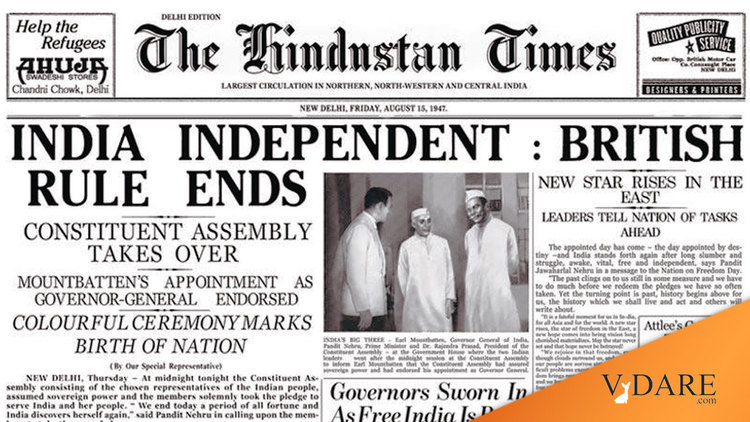


By Steve Sailer
08/15/2022
The guy who carved up novelist Salman Rushdie on August 12, 2022 may have been trying to anticipate the 75th anniversary of the setting of Rushdie’s most prestigious novel, Midnight’s Children, August 15, 1947. The only thing I’ve read by Rushdie was an impressive New Yorker review about how Kipling, especially in Kim, had correctly portrayed how South Asia tends toward sensory overload.
But I wasn’t aware that 1981’s Midnight’s Children is Latin American style Magical Realism in the manner of Gabriel Garcia Marquez’s 1967 novel One Hundred Years of Solitude. I was charmed by One Hundred Years, but I stopped reading it halfway through because there didn’t seem any motivation to find out what happens because it was obvious the author would just change the rules to let whatever he wanted happen. From Wikipedia:
Midnight’s Children is a loose allegory for events in 1947 British Raj India and after the partition of India. The protagonist and narrator of the story is Saleem Sinai, born at the exact moment when India became an independent country. He was born with telepathic powers, as well as an enormous and constantly dripping nose with an extremely sensitive sense of smell. …
If I were born in Bombay like Rushdie in 1947, I’d want an extremely dull sense of smell.
The first book begins with the story of the Sinai family, particularly with events leading up to the fall of British Colonial India and the partition. Saleem is born precisely at midnight, 15 August 1947, therefore, exactly as old as independent India. He later discovers that all children born in India between 12 a.m. and 1 a.m. on that date are imbued with special powers. Saleem, using his telepathic powers, assembles a Midnight Children’s Conference, reflective of the issues India faced in its early statehood concerning the cultural, linguistic, religious, and political differences faced by a vastly diverse nation. Saleem acts as a telepathic conduit, bringing hundreds of geographically disparate children into contact while also attempting to discover the meaning of their gifts. In particular, those children born closest to the stroke of midnight wield more powerful gifts than the others. Shiva “of the Knees”, Saleem’s nemesis, and Parvati, called “Parvati-the-witch,” are two of these children with notable gifts and roles in Saleem’s story.
That sounds lamer than I expected.
But a lot of people like it, so it’s probably pretty good.